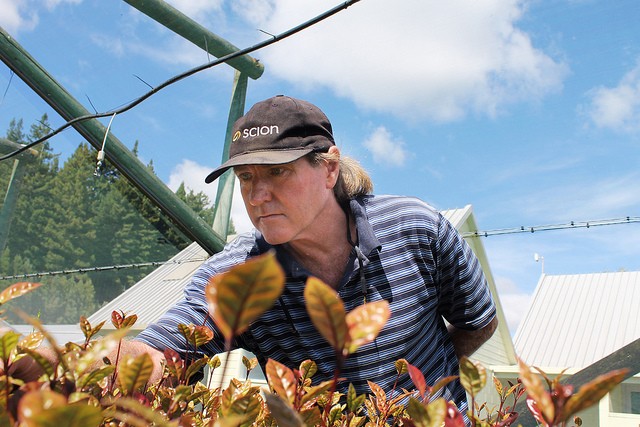Scion Nursery upgrade

Forestry in New Zealand can trace its beginnings back to the tree nurseries of Whakarewarewa (near Rotorua) established after the Mount Tarawera eruption in the late 1800s. In the years that followed, the nursery was home to the first experiments of New Zealand’s young forestry industry. That work went on to set the New Zealand nursery standard for commercial nursery practices and was established as world class.
Our proud history of nursery-based science continues today. Our research, development and expertise in nursery operations, propagation and mass production of a diverse range of species supports sustainable forestry that delivers economic and environmental benefits to all New Zealand. To ensure we are up to the challenges ahead in forestry and tissue culture science, this year Scion will build the first ‘pilot’ stage of a new nursery, specifically aimed at meeting novel science and commercial challenges in exotic and indigenous forestry.
Opportunity knocking
Changes are afoot in forestry. As we face significant challenges within the existing forestry nursery industry, such as labour shortages, changing chemical and waste management legislation, shifts in weather patterns and more, it is time to re-invent our nursery and how we grow trees. The future is in high spec, hygienic, mechanised nurseries with high throughput of seedlings and clonal material. The opportunity for indigenous propagation is also significant. Indigenous forestry is now in its infancy, not dissimilar to radiata pine 70 years ago, and Scion is ready to lead the way once more.
Scion’s Nursery Research Scientist Craig Ford says, “Our aspiration is that the New Zealand forest nursery industry becomes a leaner and more sustainable industry which provides more attractive, skilled work opportunities. Ultimately, we aim to facilitate integrated tissue culture and highly automated nursery propagation for exotic forestry into mainstream practice and to carry out more novel science in indigenous forestry."
Our pilot nursery
The first phase of the Scion Nursery redevelopment will cost around $1 million. It will be a small scale, modular, automated, lean-flow, environmentally sustainable propagation facility.
New facilities will allow Scion to pioneer and showcase more environmentally and economically sustainable production systems through improved ergonomics, hygiene, water, frost and heat management options, and improved growing media and growing container options. Such facilities will help industry move away from chemicals, plastics, non-sustainable growing media and a reliance on nonrenewable energy for heating and lighting. It will use several new-to-New Zealand forest nursery machines and techniques, such as automated paper pot sowing lines and containerised mini-hedge tunnels (mother stock for rooted cutting production of high-value genetic material).
With these facilities, the team will be able to perform climate-controlled seedling and cutting production trials for indigenous and exotic species, and tissue culture hardening, growing and ex-vitro rooting trials. Construction began in March 2019, and the new facilities will be ready in spring 2019 for the growing season.
Long-term vision
This is a first step. The longer-term vision for the Scion Nursery includes an integrated propagation research facility that incorporates generative, classical vegetative and tissue culture propagation with a high level of automation and mechanisation.
Our investment will continue to advance exotic and indigenous forestry and provide spill-over educational benefits by allowing for training through student internships
and course lecturing.
Craig sums it up, “Our vision is to develop, demonstrate and deploy technologies within New Zealand to grow improved trees more quickly, sustainably and do so without compromising on health, survival, and growth in the field for both native and exotic species.
“We’re not interested in competing with commercial scale nurseries. We want to adopt and demonstrate the latest technologies and help New Zealand nurseries reach their full potential, while also serving our science needs to advance tissue culture, propagation and pathogen management. We obviously also still retain our role as a ‘boutique’ nursery for those internal and external clients who require help producing niche crops for testing.”
